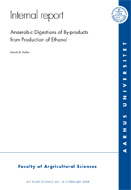DCA Publikationer
Anaerobic Digestions of By-products from Production of Ethanol
Intern rapport Markbrug, nr. 14, 2008
Af Henrik B. Møller, Dept. of Agricultural Engineering, Faculty of Agricultural Sciences
 In the present study the possibility for digestion of byproducts from ethanol processing
In the present study the possibility for digestion of byproducts from ethanol processing
industries such as stillage have been tested both in a batch digestion experiment and in a long term mesophilic continuously running experiment. The batch digestion has shown a high and fast digestibility of stillage with a methane yield of more than 350 liter CH4/kg VS for the stillage with the highest digestibility from Novelferm. The mesophilic long term digestion lasted more than 5 month and the average hydraulic retention time during the complete period was 39 days. The methane yield was 268 liter CH4/kg VS in average for the period and the VS conversion was around 60%. In spite of a relatively stable digestion and VS conversion the process showed signs of inhibition and high levels of VFAs indicating that a higher conversion and methane yield could be achieved by prolonging the retention time and/or post digestion. In the first half of the period there was only a slight inhibition, but in the last phase the inhibition was more pronounced, but not at any point leaving to serious drops in gas yield. The inhibition seemed to be initiated by a technical failure were the digester was almost emptied and had to be re-inoculated with the digested material. However some of the inhibition might also be explained by an ammonia level in the upper end of what is normally followed by inhibition. Futhermore the mesophilc temperature at 39oC is in the high range of the mesophilic temperature regime leading to higher sensitivity to ammonia, since a larger part of the ammonia will be in the undissociated form, which is the inhibiting compound. Thus choosing a slightly lower temperature might improve the digestion performance.
